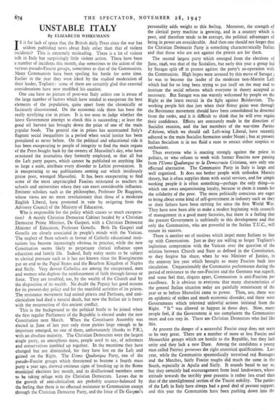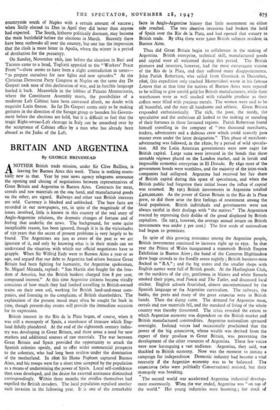UNSTABLE ITALY
By ELIZABETH WISKEMANN
Is it for lack of space that the British daily Press since the war has seldom published news about Italy other than that of violent incidents? This is extremely misleading. There is a lot of violent talk in Italy but surprisingly little violent action. There have been a number of incidents this month, due sometimes to the action of the various pseudo-Fascist groups, sometimes to that of the Communists. Many Communists have been spoiling for battle for some time. Earlier in the year they were irked by the studied moderation of their leader, Togliatti : some of them are certainly glad that external considerations have now modified his caution.
One can have no picture of post-war Italy unless one is aware of the large number of factors which have tended to exasperate the best elements of the population, quite apart from the chronically or factiously discontented. On the economic side there has been the really terrifying rise in prices. It is too soon to judge whether the latest Government attempt to check this is succeeding ; at least the good oil harvest has brought down the price of one of the main popular foods. The general rise in prices has accentuated Italy's flagrant social inequalities in a period when social justice has been postulated as never before. On the political and educational side it has been exasperating to people of integrity to find the main organs of the Press bought back by the owners of Mussolini's day, who have reinstated the journalists they formerly employed, so that all but the Left party papers, which cannot be published on anything like so large a scale, attribute every disorder to Leftist provocation. It is exasperating to see publications coming out which insidiously praise poor, wronged Mussolini. It has been exasperating to find some of the most unprincipled Fascists reinstated as teachers in schools and universities where they can exert considerable influence. Eminent scholars such as the philosopher, Professor De Ruggiero, whose views are no more revolutionary than those of a moderate English Liberal, have protested in vain by resigning from the Advisory Council of the Ministry of Education.
Who is responsible for the policy which causes so much exaspera- tion? A mainly Christian Democrat Cabinet headed by a Christian Democrat Prime Minister, De Gasperi, with a Christian Democrat Minister of Education, Professor Gonella. Both De Gasperi and Gonella are closely associated in people's minds with the Vatican. The neglect of State schools in favour of Catholic educational insti- tutions has become increasingly obvious in practice, while the new Constitution seems likely to perpetuate clerical influence upon education and family life. Indeed, Italy today seems to be subject to clerical pressure such as it has not known since the Risorgimento put an end to the Papal States and the Bourbon Kingdom of Naples and Sicily. Very devout Catholics are among the exasperated, men and women who deplore the reinforcement of faith through favour or force. They are troubled, too, by the wealth of the Church and by the disposition of its wealth. No doubt the Papacy has good reasons for its present-day policy and for the manifold activities of its priests. The resistance movement had united priests and Partisans, and anti- clericalism had died a natural death, but now the Italian air is heavy with the resurrection of this ancient conflict.
This is the background to the political battle to be joined when the first regular Parliament of the Republic is elected under the new Constitution next March. When the Constituent Assembly was elected in June of last year only three parties large enough to be important emerged, no one of them, unfortunately (thanks to P.R.), with an absolute majority. The Christian Democrats were the largest single party, an amorphous mass, people used to say, of reformers and conservatives jumbled up together. In the meantime they have changed but not diminished, for they have lost on the Left and gained on the Right. The Uomo Qualunque Party, one of the pseudo-Fascist groups which threatened to become a fourth mass party a year ago, showed ominous signs of breaking up in the Rome municipal elections last month, and its disillusioned members seem to be taking refuge with the Christian Democrats. Losses due to the growth of anti-clericalism are probably counter-balanced by the feeling that there is no effectual resistance to Communism except ,through the Christian Democrat Party, and the force of De Gasperi's
personality adds weight to this feeling. Moreover, the strength of the clerical party machine is growing, and in a country which is poor, and therefore tends to be corrupt, the political advantages of being in power are considerable. And then one should not forget that the Christian Democrat Party is something characteristically Italian and that those who are not against the priests are for them.
The second largest party which emerged from the elections of June, 1946, was that of the Socialists, but early this year a group led by Saragat split off in protest against the party's co-operation with the Communists. High hopes were aroused by this move of Saragat ; he was to become the leader of the moderate non-Marxist Left which had for so long been trying to put itself on the map and to institute the social reforms which everyone in theory accepted as necessary. But Saragat was too warmly welcomed by people on the Right as the latest recruit in the fight against Bolshevism. The working people felt that just when their flimsy gains won through the Resistance movement should have been consolidated he deserted from the ranks, and it is difficult to think that he will ever regain their confidence. Efforts are constantly made in the direction of Socialist reunion, and the last members of the war-time Partito d'Azione, which we should call Left-wing Liberal, have recently adhered to the main Socialist formation under Nermi ; but at present Italian Socialism is in too fluid a state to attract either sceptics or enthusiasts.
Thus everyone who is reacting strongly against the priest in politics, or who refuses to work with former Fascists now passing from l'Uomo Qualunque to la Democrazia Cristiana, sees only one effectual alternative. The Communist Party in Italy is large and well organised. It does not bother people with orthodox Marxist theory, but it often supplies them with social services, and for simple working people it is often something—perhaps the only thing—to which one owes unquestioning loyalty, because to them it stands for the solidarity of the poor. The more politically conscious are eager to bring about some kind of self-government in industry such as they or their fathers have been striving for since the first World War. They have now been able to make a modest beginning with councils of management in a good many factories, but there is a feeling that the present Government is unfriendly to this development and that only the Communists, who are powerful in the Italian T.U.C., will ensure its success.
There is another set of motives which impel many Italians to line up with Communism. Just as they are willing to forget Togliatti's inglorious compromise with the Vatican over the question of the relation between Church and State as defined in the Constitution, so they forgive his share, when he was Minister of Justice, in the amnesty last year which brought so many Fascists back into circulation. Unquestionably the Communist performance during the period of resistance to the neo-Fascists and the Germans was superb, and some feel that, slogans apart, Communism is anti-Fascism par excellence. It is obvious to everyone that many characteristics of the general Italian situation today are painfully reminiscent of the year or so before Mussolini came to power. Then, too, there was an epidemic of strikes and much economic disorder, and there were Governments which tolerated unlawful actions initiated from the Right. " It " was allowed to happen in those days. Now, many people feel, if the Government is too complacent the Communists must and can step in. There are Christian Democrats who feel like this.
At present the danger of a successful Fascist coup does not seem to be very great. There are a number of more or less Fascist and Monarchist groups which are hostile to the Republic, but they lack unity and they lack a new Duce. Among the candidates a young man called Patrissi possesses the right oratorical qualifications. Last year, while the Communists spasmodically terrorised red Romagna and the Marches, fairly Fascist toughs did much the same in the South, especially in Apulia and Sicily. It sounds banal to say so, but they certainly had encouragement from local landowners, whose attitude towards the terribly poor peasants is rather less cruel than that of the unenlightened section of the Tsarist nobility. The parties of the Left in Italy have always had a good deal of peasant support, and this year the Communists have been pushing down into the countryside south of Naples with a certain amount of success ; when Sicily elected its Diet in April they did better than anyone had expected. The South, hitherto politically dormant, may become the main battlefield• before the elections in March. Recently there have been outbreaks all over the country, but one has the impression that the clash is more bitter in Apulia, where the winter is a period of destitution for the peasantry.
On Sunday, November 26th, just before the situation in Bari and Taranto came to a head, Togliatti appealed to the " Workers' Peace Front "—there seems to have been a slight contradiction in terms- " to prepare ourselves for new fights and new episodes." At the Christian Democrat Party Congress at Naples on the same day De Gasperi took note of this declaration of war, and in forcible language hurled it back. Meanwhile in the lobbies of Palazzo Montecitorio, where the Constituent Assembly meets, the possibilities of a moderate Left Cabinet have been canvassed afresh, no doubt with exquisite Latin finesse. So far De Gasperi seems only to be making gestures in the direction of the Saragat group to broaden his Govern- ment before the elections are held, but it is difficult to feel that the tragic Right-versus-Left cleavage in Italy can be smoothed over by the acceptance of Cabinet office by a man who has already been abused as the Judas of the Left.





























 Previous page
Previous page